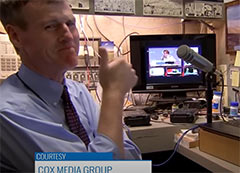Your muscles usually move only when you want them to. But when you have dystonia, your muscles can contract on their own. The word dystonia means "abnormal muscle tone," which can also include spasms and tremors. This neurological condition can make it hard to do everyday tasks, but help is available at Emory Healthcare.

Dystonia
Expert Care for Dystonia
Why Choose Emory Healthcare?
Neurologists with the Movement Disorders Program have the expertise to diagnose and treat all types of dystonia. We offer the latest diagnostic tools and the most up-to-date treatments.
Our doctors are familiar with related neurological conditions, which helps us rule out other disorders. When you need dystonia care to help you manage your disease, you can rely on our team at Emory Healthcare.
Types of Dystonia
There are different types of dystonia. We classify them by the age when they begin, the areas of the body affected and the cause. One important cause can be genetics, since certain disorders run in families.
Secondary dystonia occurs when there is a brain injury (this can include stroke and trauma), Parkinson’s disease or drug side effects causing movement problems. When movement issues occur on their own, it’s known as primary dystonia.
-
Early Onset Dystonia
-
Adult-Onset Dystonia
-
Cervical Dystonia (Spasmodic Torticollis)

Signs and Symptoms of Dystonia
Signs of dystonia depend on the type of disease you have. They may include:
- Cramping in your foot or foot-dragging (foot drop)
- Cramping of your arms or hands, especially during tasks such as writing (writer's cramp)
- Facial spasms, which can include eyelids (blepharospasm) and your jaw (oromandibular dystonia)
- Pulling of your neck to the side
- Tremors of your arms, head or legs
- Twitching or spasms around your eyes
Diagnosing Dystonia
To diagnose dystonia, doctors will talk with you about your symptoms and medical history. They will also conduct a physical exam and may ask you to make certain movements while they watch you.
Your doctor may want to do additional tests, including:
- A neurological exam
- Blood or urine tests to check for causes related to toxins, infections or metabolic issues
- Blood tests to look for genetic causes
- Imaging studies, such as MRI, to rule out other reasons for your symptoms
Dystonia Treatments
We offer innovative, medical and surgical treatment options for dystonia.
* View our call center hours
Please visit our privacy policy for more information.
Find an Emory Doctor
Explore our Network
Make an Appointment with Emory Neurology & Neurosurgery
Create a MyChart account to schedule online.
For the neurology department, call 404-778-3444.
For the neurosurgery department, call 404-778-5770.
Make an Appointment with Emory Neurology & Neurosurgery
Create a MyChart account to schedule online.
For the neurology department, call 404-778-3444.
For the neurosurgery department, call 404-778-5770.

